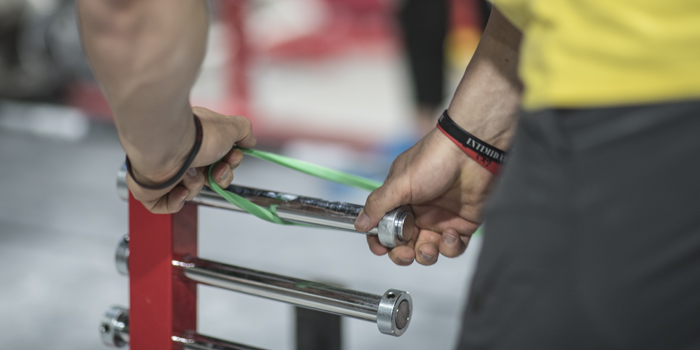
I started out writing a very different article than this one, extolling the virtues of using bands for powerlifting training in a conjugate-based format. Personal experience has taught me a few very profound things leading up to my next meet, which I shamefully have to back out of due to injury. So instead, I'm writing about a few things many lifters often overlook when it comes to bands.
Bands are awesome. I use bands, guys stronger than me use bands, and you should use bands. Accommodating resistance straight up works. However, there's a piece to that puzzle that I don’t think anyone ever really discusses: using bands too often can ruin you for straight weight. Now, don't start regurgitating the old "bands mimic tendons" spiel. And yes, of course, band tension is not the same as straight weight. And yes, of course, it's lighter at the bottom than the top. Here's what experience has taught me: any band tension above 100 pounds (for a 220-pound or heavier lifter; I can't say what the ratio is for lighter trainees) stabilizes the bar way more than you realize in the squat. So much so that, even though you may be able to unrack and squat 750 pounds with different band combinations from 100 to 350 pounds, even unracking 700 pounds with straight weight is a major shock and shockingly difficult. Using bands every week for dynamic effort squats WILL hinder your ability to handle max effort weights without bands.
READ: Has the Max Effort Method Been Forgotten?
I'm not saying you should stop using bands. I'm saying that since you're employing the conjugate system, you must also conjugate your accommodating resistance. Like everything else that waves in conjugate, simply use three-week waves of bands, chains, and straight weight. The guideline for this is 75% to 85% if you're wearing squat briefs. Otherwise, speed is more important than weight and the guidelines changes to something more like 50% to 70%.
The other largely ignored or unspoken trick to year in, year out conjugate training is underloading. I don’t care how many variations you pick for max effort upper and lower (though really, you shouldn't get lost in variation; pick several that work, keep track of them, break your records by five to 10 pounds each time you revisit, and don't keep picking new variations forever), eventually you will get tired and stop making progress. How can you avoid this? Underloading. Variations shouldn't be too far removed from the classical lift, and weekly "minor adjustments" to your squat, bench, or deadlift over time can be extremely taxing. Just as the law of accommodation tells us not to perform the same exercise more than three weeks in a row, you must now even conjugate your max effort days themselves! After one to three weeks of max effort variations, pick an exercise that restricts even your ability to handle heavy loads. For example, I can't squat 700 pounds every week. But what I can do is take a max effort box squat week one, and then on week two perform a five-rep max good morning with a difficult specialty bar (such as the SS Yoke Bar, which takes 70 pounds off my good mornings).
Underloading is NOT deloading. You're still exerting maximal effort. It's just that the nature of the exercise precludes the use of heavy weight. Now that you've satisfied your max effort for the week you can return to handling heavier weights fresh next week. The conjugate system works. You just have to work it.
A powerlifter from Philadelphia, Pennsylvania, Jason trains at Steve Pulcinella's Iron Sport Gym.










Great gym. I used to visit and train every time I was in Philadelphia.